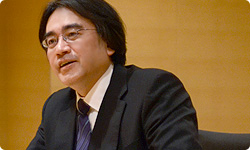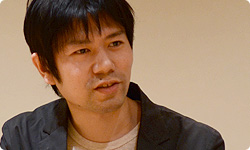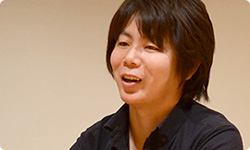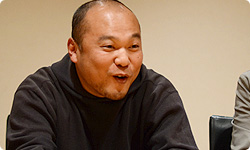3. Like a TV Series
Could you tell me about the story?
This time, the story is extremely voluminous and packed full of ideas.
We decided at the very beginning on a serial drama format. There’s a method called a cliffhanger.12 It means ending a cutscene and making you wonder what happens next, with short scenes that follow one after the other, while showing quick, different plotlines unfolding for different characters. We wanted to try that this time. 12Cliffhanger: A dramatic technique that ends a scene right in the middle of a desperate situation in order to keep the audience interested.
That way you get pulled into the world of the story.
Yes. We created 12 scenarios that we wanted to end a certain way in a specific situation and had the scriptwriters link them together. Some got cut out that wouldn’t fit no matter what, though. During the development process, the story writing and game development ran practically in parallel so being able to make changes as we were making the game had a big influence on how each of the stages turned out. Hori-san made lightning-fast decisions when it came to sorting things out.
We recognised each other’s strengths and did a good job of dividing up the work, with what I could entrust to Hori-san going to him, and pulling it all together going to Nakanishi-san.
Well, it does get somewhat out of hand, but I think we were able to walk a fine line to make players think, “Maybe that could really happen!”
But don’t Resident Evil stories tend to end with something absolutely unbelievable? (laughs)
(laughs)
But you subtly build upon something that seems possible, so as you’re playing, you get drawn into the world.

That’s right! (laughs) That’s our traditional art, you might say, carried on since the early days of the series. And we’ve done it this time, too.
In the latter half, we tend to be like, “As long as it’s fun, it’ll be fine!” (laughs)
(laughs)
Capcom is always like that. We make the main events interesting and then fill in the gaps with forced logic.
Ohh... You just come right out and say it? (laughs)
Yes. (laughs)
This time, the contribution of the sound to playing horror is considerably high. Now we can finally hear from Suzuki-san.
Thank you! (laughs) When I saw the first trailer at E3, I thought it was incredible, so I nominated myself and joined the team. I made a conscious effort to create rich sound effects and music to stand up to the graphics. Our concept was to go back to old-style horror, so in conformity with that, we generated a mysterious feeling with the music, and sometimes left out music and used only sound effects.

We determined the direction for the music fairly early on, right?
Yes. When I heard from Nakanishi-san that it was going to be like a foreign TV series, I made some catchy theme music. And I put recurring theme music into the first flashback scene and brief transitional clips and so on.
The song called really sticks in your head, so we’ve put it in all the trailers.
Ah. Like you would for a movie.
Yes. And this may just be my own preconception, but the game is set out at sea, and when it comes to the sea and suspense, I think of piano music.
(laughs)
Where’s the connection?! (laughs)
When I saw the first demo, for some reason a piano came to me! (laughs) We recorded a piano and orchestral instruments, and tried to make the sound richer.
After we finished the first recording session, I thought, “That should be good enough,” but he came up to me, with his eyes all red, and said, “Kawata-san, it isn’t enough, so let me record more!” (laughs) That’s how much enthusiasm he put into making the sound.

For the second recording, in addition to an orchestra, we recorded things like a choir and violin solos, really pushing to the limit. The sound effects and voices are really rich, too.
For the first time in the series, we recorded voices in Japanese. I think that helped make it feel even more like a foreign TV drama. Editor’s note: When foreign TV dramas are broadcast in Japan, the shows are often aired with Japanese voice-overs where the voice actors frequently use terms and expressions that are hardly found in daily conversations in Japanese culture, which comes across as distinctive to the Japanese fans and gives the sense they’re watching a foreign TV drama. Here, Kawata-san is saying that it helps make the game feel like a foreign TV drama because this game follows that voice-over style.
Yes, that, too, was for making it feel like a foreign drama. If it were just English voices, those who couldn’t understand English wouldn’t be able to turn the subtitles off, so we put in voices for the whole game.
And it’s not just Japanese that we put in, we also put in FIGS13. 13FIGS: An acronym for French, Italian, German and Spanish. Resident Evil Revelations features voice-overs for these languages in addition to English and Japanese.
Even compared with other game genres, sound is particularly important for horror games. We can’t get players in the mood if we don’t pay as much attention to sound as we do on the visuals and gameplay. Actually, if you turn the sound off, it becomes much less scary. Several people in the company play-tested without sound once, and then turned in written comments to the effect that it wasn’t scary at all. After that, we were very specific that they have headphones when we show it at events!

It’s perfect for the Nintendo 3DS system’s surround mode. The sound effects are quite elaborate, so if you wear headphones, it feels like you are really surrounded by that space. Above all else, I recommend playing in a dark place, with the 3D depth slider cranked way up and headphones on. (laughs)
The sound clearly conveys exactly where you are walking.
Yes. Ever since way back, we have paid attention in the Resident Evil series to the sound of footsteps, so we talked it over thoroughly with the scroll team and determined the sound of footsteps in line with the type of material underfoot.
You thought about it and took action yourselves. That’s a good team.
Our teamwork was good. We maintained eye contact as we worked.
Everyone thought and acted for themselves in order to bring out their best in a short period of time, and I think that led to the results this time.